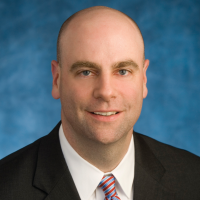Private Prison Industry Panics as States Rethink Costs of Mass Incarceration
 Damon Hininger, President and CEO of CCA
Damon Hininger, President and CEO of CCA
Shrinking state budgets have forced policymakers to consider alternatives to incarceration for convicted criminals, which in turn has forced private prison operators to try a risky new strategy to stay in business.
Until now, companies like the Corrections Corporation of America (CCA), the nation’s largest private prison business, concentrated on running state- or locally-owned jails and facilities. This approach left the capital costs associated with penitentiaries in government hands and allowed CCA to make money off manning prisons and keeping watch over inmate populations.
But with state budgets in the red, many legislatures are gauging ways to deal with criminals other than just locking them up, in order to cut down on expenditures for corrections. Instead of continuing to allocate more than $50 billion a year on prisons, lawmakers—including those long espousing tough-on-crime platforms—are open to shifting monies to support drug treatment and mental health services, as well as beefing up parole and probation programs.
Fearful that these changes could mean the loss of contracts, CCA earlier this year went outside its business model and offered to buy a state prison in Ohio. The deal meant $72 million for the state, which the company hoped would prove too enticing for policymakers to turn down.
The company wasn’t done, however. It said it was willing to spend $250 million to purchase prisons in other states struggling to close deficits. In return, CCA sought long-term contracts—20 to 30 years in length—but only if states guaranteed that they would keep the correctional facilities nearly full (90% or higher).
Judith Greene, director of the nonprofit Justice Strategies, told the ABA Journal that CCA’s “corrections investment initiative” represents an attempt “to sustain its once-again-threatened business model” and avoid a serious drop in revenues. In 2010, half of CCA’s revenue of $1.67 billion came from the states and 43% came from the federal government as a result of contract with the U.S. Marshals Service, the Federal Bureau of Prisons and U.S. Immigration and Customs Enforcement (ICE).
-Noel Brinkerhoff
To Learn More:
Prison Break: Budget Crises Drive Reform, But Private Jails Press On (by Terry Carter, ABA Journal)
How Lawmakers and Lobbyists Keep a Lock on the Private Prison Business (by Sadhbh Walshe, The Guardian)
$2 Billion a Year Industry: Housing Illegal Immigrants (by Noel Brinkerhoff, AllGov)
Private Prison Company to Demand 90% Occupancy (by Noel Brinkerhoff and David Wallechinsky, AllGov)
Private Prison Industry Helped Create Anti-Immigrant Law in Arizona (by Noel Brinkerhoff and David Wallechinsky, AllGov)
- Top Stories
- Unusual News
- Where is the Money Going?
- Controversies
- U.S. and the World
- Appointments and Resignations
- Latest News
- Musk and Trump Fire Members of Congress
- Trump Calls for Violent Street Demonstrations Against Himself
- Trump Changes Name of Republican Party
- The 2024 Election By the Numbers
- Bashar al-Assad—The Fall of a Rabid AntiSemite






Comments